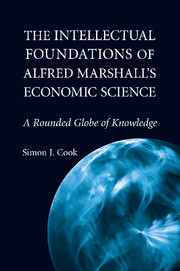Book contents
- Frontmatter
- Contents
- Acknowledgments
- List of Abbreviations
- Introduction
- PART I THE CONTEXTS OF MARSHALL'S INTELLECTUAL APPRENTICESHIP
- PART II DUALIST MORAL SCIENCE: 1867–1871
- 3 Mental Crisis
- 4 The Way of All Flesh
- 5 Political Economy
- PART III NEO-HEGELIAN POLITICAL ECONOMY: 1872–1873
- EPILOGUE: “A ROUNDED GLOBE OF KNOWLEDGE”
- Bibliography
- Index
- Titles in the series
4 - The Way of All Flesh
Published online by Cambridge University Press: 25 October 2009
- Frontmatter
- Contents
- Acknowledgments
- List of Abbreviations
- Introduction
- PART I THE CONTEXTS OF MARSHALL'S INTELLECTUAL APPRENTICESHIP
- PART II DUALIST MORAL SCIENCE: 1867–1871
- 3 Mental Crisis
- 4 The Way of All Flesh
- 5 Political Economy
- PART III NEO-HEGELIAN POLITICAL ECONOMY: 1872–1873
- EPILOGUE: “A ROUNDED GLOBE OF KNOWLEDGE”
- Bibliography
- Index
- Titles in the series
Summary
INTRODUCTION
On a Friday evening in the late 1860s, the Grote Club assembled as usual in the college rooms of one of its members. The week before, this discussion group of Cambridge moral scientists had listened to Marshall's defense of Ferrier's first proposition. This week they were to hear the second half of his psychological project – a paper entitled “Ye Machine.” The members of the Grote Club, or at least those who had been in attendance at the earlier meeting, had some idea of what to expect from the evening's paper. As we have seen, in “Ferrier's Proposition One” Marshall had expressed approval of Bain's attempt to establish physical correlates of mental phenomena. He had also insisted that self-consciousness had no physical analogy and argued that, in the absence of self-consciousness, no changes in the body could generate mental phenomena. But the position outlined in this previous paper suggested that much of our mental life was nevertheless explicable in terms of changes in the state of the brain. The business of this Friday's paper, “Ye Machine,” was to outline a model of the operation of the physical correlates of mental phenomena.
Marshall's model is at first sight rather odd. He begins “Ye Machine” by postulating the existence of a machine capable of receiving impressions from the outside world, and the main part of the paper is devoted to building up an account of the various parts of the machine that enable it to deliberate on its actions in the world.
- Type
- Chapter
- Information
- The Intellectual Foundations of Alfred Marshall's Economic ScienceA Rounded Globe of Knowledge, pp. 120 - 149Publisher: Cambridge University PressPrint publication year: 2009

